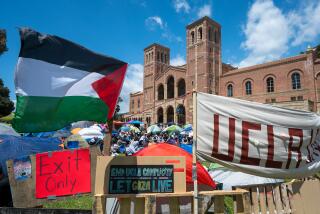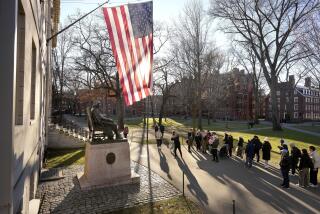Christian Legal Society vs. UC Hastings School of the Law
T he U.S. Supreme Court agreed last week to referee a dispute between a University of California law school and a Christian student group that claims it’s being discriminated against -- in the name of antidiscrimination. The Christian Legal Society, which requires its members to forswear sex outside heterosexual marriage, is contesting the refusal of UC Hastings College of the Law in San Francisco to afford it the privileges enjoyed by other student groups.
It’s tempting for believers in equality for gays and lesbians (ourselves included) to side with the law school. But more is involved in this controversy than the school’s opposition to discrimination on the basis of sexual orientation. The issue for the court is whether Hastings is denying the Christian group access to university facilities because of its beliefs, not its conduct. On this point, the Christian Legal Society has a strong case.
Hastings accords a broad range of groups the status of “recognized student organization,” which gives them permission to use the college logo as well as access to college newsletters, bulletin boards and some activity fees. Any such group must inform its members and others that it is not sponsored by the college. That would seem self-evident given the diversity of the organizations. Recognized groups include Republican and Democratic societies, organizations for and against abortion rights, and groups such as the Black Law Students Assn. and the Vietnamese American Law Society.
When the Hastings chapter of the Christian Legal Society applied for recognition, it was refused on the grounds that it violated the college’s policy against unlawful discrimination “on the basis of race, color, religion, national origin, ancestry, disability, age, sex or sexual orientation.” The school argued that although the society opens its meetings to all, it limits voting membership and leadership positions to students who subscribe to its interpretation of Christian doctrine, including a prohibition on homosexual conduct. That, according to Hastings, constituted discrimination against both non-Christians and gays.
The first of those charges is easy to dispense with. A 1995 Supreme Court decision involving the University of Virginia made it clear that state schools may not deny student religious groups access to activity fees available to other student groups. But what about the college’s ban on discrimination based on sexual orientation? The Christian Legal Society argues that students with a homosexual orientation may join, and even lead, the group if they embrace its opposition to homosexual conduct.
We realize, of course, that very few, if any, gay and lesbian students would fall into that category. But that’s not the point. The point is that the Christian Legal Society determines eligibility for membership not on who an applicant is but on whether he or she holds -- and lives by -- certain beliefs. In that sense it is no different from other groups united by a political or economic philosophy. Granted, some students find the society’s beliefs offensive, and not all Christians share its views about homosexuality. But once the law school decided to recognize a variety of student organizations, it was required by the 1st Amendment to not pick and choose on the basis of beliefs, religious or otherwise.
More to Read
Sign up for Essential California
The most important California stories and recommendations in your inbox every morning.
You may occasionally receive promotional content from the Los Angeles Times.










